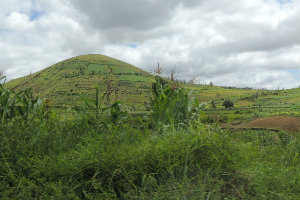 Effect of climate change in west Africa and Madagascar on the diversity of soil microorganisms and consequences on ecosystem services
Effect of climate change in west Africa and Madagascar on the diversity of soil microorganisms and consequences on ecosystem services
Agriculture has enormous potential for sustaining growth in Africa. However, it is based mainly on rain-fed crops, 80% of which are produced by small farmers who only have access to organic inputs as amendments. It is also highly vulnerable to climatic factors. Soil microorganisms play the main role in the mineralization of organic matter and nutrient recycling. They are a huge bank of diversity (106 species of bacteria and fungi) and each species is responsible for at least one stage in the transformation of organic matter. It is, therefore, essential to maintain microbial biodiversity so that the soil can provide the ecosystem services of primary production, nutrient recycling and carbon sequestration.
Aims
- Understand how microbial biodiversity can be affected by land usage and climate in two sub-sahelian regions of Africa with different soils and climates (Madagascar and West Africa)
- Understand how changes in microbial biodiversity can affect the function of mineralization which helps to provide the three ecosystem services of primary production, nutrient recycling and carbon sequestration
- With stakeholders and modeling experts create a user friendly tool for drawing up scenarios to help in the management of natural productive resources.
Date
March 2014 to February 2019
Partners
Academic institutes: IRD (UMR UMMISCO), INRA (UMR Agroecology), University of Antananarivo (Radioisotope Laboratory), Senegal Agricultural Research Institute , ISRA (LEMSAT).
Stakeholders: Agrisud international (Madagascar) and ASK (Burkina Faso)
Funding
FRB, Foundation for Research on Biodiversity
Contact
Laetitia Bernard, IRD Madagascar
e-mail :






